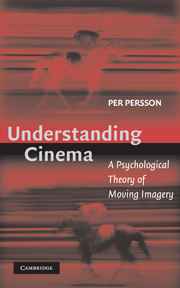Book contents
- Frontmatter
- Contents
- List of Illustrations
- Preface and Acknowledgments
- Understanding Cinema
- 1 Understanding and Dispositions
- 2 Understanding Point-of-View Editing
- 3 Variable Framing and Personal Space
- 4 Character Psychology and Mental Attribution
- 5 The Case for a Psychological Theory of Cinema
- Notes
- References
- Index
5 - The Case for a Psychological Theory of Cinema
Published online by Cambridge University Press: 15 July 2009
- Frontmatter
- Contents
- List of Illustrations
- Preface and Acknowledgments
- Understanding Cinema
- 1 Understanding and Dispositions
- 2 Understanding Point-of-View Editing
- 3 Variable Framing and Personal Space
- 4 Character Psychology and Mental Attribution
- 5 The Case for a Psychological Theory of Cinema
- Notes
- References
- Index
Summary
Illusionist theorists usually insist that only avant-garde texts make the viewer perform an ‘active’ reading, or force the viewer to ‘work to produce meaning.’ The Hollywood spectator, it is claimed, is little more than a receptacle; few skills of attention, memory, discrimination, inference-drawing, or hypothesis-testing are required. Now this is clearly too simple. Classical films call forth activities on part of the spectator. These activities may be highly standardized and comparatively easy to learn, but we cannot assume that they are simple.
(Bordwell et al., 1985:7)It is hoped that this study has presented a reasonably coherent psychological theory of cinema. I believe that this theory constitutes a somewhat new approach to the phenomenon of cinema, at least as far as cinema studies goes. Theories often acquire identity and motivation from the question they pose and seek to answer. A psychological theory of cinema poses the following questions:
In what way do textual structures and the mentally represented dispositions of the spectator interact, and how does meaning and coherence arise out of this?
This question has different variations according to perspective:
2. From the standpoint of the spectator: What dispositions in the spectator are used to make sense of a given convention, device, or film, and what mental processes are involved?
3. From the standpoint of the text: How does the text (convention, film, or genre) trigger, and thus make use of, the dispositions in the spectator in order to create a specific effect of meaning, emotion, or aesthetics?
[…]
- Type
- Chapter
- Information
- Understanding CinemaA Psychological Theory of Moving Imagery, pp. 247 - 250Publisher: Cambridge University PressPrint publication year: 2003



